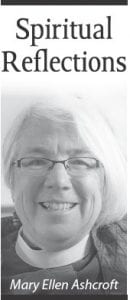Hearing President Obama’s eulogy for Clemente Pinckney, and his focus on grace, I wondered, “What is the opposite of grace?” Hmm… Fear, scarcity, calculation, greed. These are all sucking things—limiting, strangling, constricting. Grace is the polar opposite—abundance, hope, open-heartedness, generosity. Grace overflows, surprises us.
Jesus’ parables portray grace. In “The Prodigal Son” (better named “The Gracious Father”) the loser is the older brother who doesn’t want his naughty, younger brother to be celebrated. “It’s not fair,” he mutters sulkily. Or the parable of the land owner who hires laborers—some early, some at noon and some late afternoon—and pays them the same amount! “We were here all day, and it was hot,” they complain. “It’s not fair.”
No, it’s not fair. Grace is not fair. Grace is nonsensical in its abundance, its impracticality, its choice of the sinner over the righteous, its bringing life from death. Grace is unearned, and those who’ve been good and who’ve worked so hard, want it to be fairer.
Jesus lived this grace and offered it freely, threatening the religious leaders of his day. Their responses: “Why don’t you wash your hands properly?” “Why do you eat with tax collectors and sinners?” “Why do you heal on the Sabbath?” Paraphrased: “If you were really in touch with God you would enforce the rules, make sure those we disapprove don’t get in. Offering God’s abundant love to anyone—well, who knows what might happen?!” They insulted Jesus by calling him a glutton and a wine-bibber. This guy celebrated too much! He was not strict enough.
Jesus’ anger boils over at people trying to block the flow of grace. “How dare you,” he rails, “put impossible burdens on people, and not lift a finger to help them?” “Woe to you. You are like white washed tombs with bones inside.” Or more tactfully, “Tax collectors and sinners are going into the Kingdom before you!”
Why do religious insiders often seem to work against God’s gracious action? God’s grace moves toward abundance, toward more people seated at the table. You see this in the whole arc of the biblical story: God chooses Abraham, then the whole people of Israel. As the circle grows, the chosen people are reminded that they are “blessed to be a blessing,” that God’s promise includes the alien in the land. Then in the person of Jesus—God “lives out” grace—the circle widens to include the despised “tax collectors and sinners.” In the earliest Christian movement, the message goes beyond the chosen to Gentiles and “the ends of the Earth.”
We can see these widening circles more specifically. Eunuchs, for example, were banned from God’s assembly in Deuteronomy. But a few hundred years (and pages) later in Isaiah, God tells eunuchs who come toward God that they will be given an everlasting name. And in the earliest Christian movement, Phillip preaches to an Ethiopian eunuch and then baptizes him, bringing him fully into the family: from “banned” to “full member.”
It’s never easy for religious insiders to accept a bigger circle. In the earliest Christian movement the message seemed clear: Grace had come in Jesus, and the message was moving beyond God’s chosen—to Gentiles for heaven’s sake! Former slaves, prostitutes, and thieves came into the new church. But then religious insiders arrived from Jerusalem saying, “What Paul says about grace isn’t enough. You have to be circumcised.” Paul gets so mad at those who are pulling the rug of grace from under these Galatian believers that he writes, “I wish those people who are telling you to be circumcised would castrate themselves.” Not one of the verses you memorized in Sunday school, but important, because it shows Paul’s fury with those who are trying to substitute obligations for grace.
And it goes on. We are tempted to slam the door after we’ve entered, to exclude those we find difficult. I must ask myself, “Who do I want to bar from the banquet?” I can be sure God wants to welcome them, and I am called to open my heart.
God’s heart overflows with love. Our little minds struggle to comprehend this overwhelming grace. None of us will be excluded because others are welcomed. That’s amazing grace.
Each month a member of the Cook County Ministerium will offer Spiritual Reflections. This month’s contributor is Mary Ellen Ashcroft, Vicar of Spirit of the Wilderness Episcopal Church.



Loading Comments